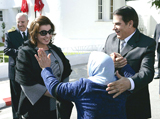Tunisian President Zine al-Abidine Ben Ali has won a fifth term with 89.62 percent of the vote in the North African country’s presidential election, the state news agency said yesterday.
One opposition party called Sunday’s vote a missed opportunity to move the North African country towards democracy, echoing accusations by international human rights groups that the campaign took place in an atmosphere of repression.
Ben Ali, who is 73 and has been in power for 22 years, has rejected those allegations and warned that anyone spreading lies to damage the country’s image will be prosecuted.

PHOTO: AFP
Ben Ali’s margin was down slightly compared with the 94.4 percent he received in the last election five years ago, a dip that may help deflect foreign criticism that the latest race was tilted in his favor.
His RCD ruling party won 75 percent of the seats in a parliamentary vote held simultaneously on Sunday, the official news agency TAP reported.
The Interior Ministry, which oversaw the voting, is expected to formally announce the outcome of boths elections later yesterday.
Ben Ali has established Tunisia as a moderate voice in the Arab world and Western governments view it as a bulwark against Islamist extremism, although some have raised questions about its record on democracy.
Tunisia’s most prominent opposition figures did not take part in the election.
Two of Ben Ali’s challengers on the ballot rarely criticize the president and the third acknowledged during the campaign that he could not win.
“The regime has missed another opportunity to carry out a democratic transition in Tunisia,”said Rachid Kechana, deputy secretary-general of the opposition PDP party, which boycotted the election.
“The election was meaningless and the results confirm that,” he said.
International human rights groups have alleged that campaigning took place in an atmosphere of repression. Ben Ali, 73, hit back on Saturday by saying the vote would be democratic and accusing his opponents of peddling lies.
Many voters in Sunday’s election said the president deserved another term because he had made Tunisia one of the region’s most stable and prosperous countries.
“He is the savior of our country,” said 50-year-old Nejia Azouzi as she voted for Ben Ali in the capital on Sunday.
The Tunisian president came to power in 1987 when doctors declared his predecessor, Habib Bourguiba, unfit to rule after more than 30 years in power.
Official figures showed a high turnout on Sunday, but with most Tunisians in little doubt about the outcome of the vote, enthusiasm was muted.
“What is the point in taking part?” said one young man in a cafe in Tunis, who asked not to be identified. “Everything that is happening is just a show.”

The team behind the long-awaited Vera Rubin Observatory in Chile yesterday published their first images, revealing breathtaking views of star-forming regions as well as distant galaxies. More than two decades in the making, the giant US-funded telescope sits perched at the summit of Cerro Pachon in central Chile, where dark skies and dry air provide ideal conditions for observing the cosmos. One of the debut images is a composite of 678 exposures taken over just seven hours, capturing the Trifid Nebula and the Lagoon Nebula — both several thousand light-years from Earth — glowing in vivid pinks against orange-red backdrops. The new image

Canada and the EU on Monday signed a defense and security pact as the transatlantic partners seek to better confront Russia, with worries over Washington’s reliability under US President Donald Trump. The deal was announced after a summit in Brussels between Canadian Prime Minister Mark Carney and European Commission President Ursula von der Leyen and European Council President Antonio Costa. “While NATO remains the cornerstone of our collective defense, this partnership will allow us to strengthen our preparedness ... to invest more and to invest smarter,” Costa told a news conference. “It opens new opportunities for companies on both sides of the

ESPIONAGE: The British government’s decision on the proposed embassy hinges on the security of underground data cables, a former diplomat has said A US intervention over China’s proposed new embassy in London has thrown a potential resolution “up in the air,” campaigners have said, amid concerns over the site’s proximity to a sensitive hub of critical communication cables. The furor over a new “super-embassy” on the edge of London’s financial district was reignited last week when the White House said it was “deeply concerned” over potential Chinese access to “the sensitive communications of one of our closest allies.” The Dutch parliament has also raised concerns about Beijing’s ideal location of Royal Mint Court, on the edge of the City of London, which has so

OVERHAUL: The move would likely mark the end to Voice of America, which was founded in 1942 to counter Nazi propaganda and operated in nearly 50 languages The parent agency of Voice of America (VOA) on Friday said it had issued termination notices to more than 639 more staff, completing an 85 percent decrease in personnel since March and effectively spelling the end of a broadcasting network founded to counter Nazi propaganda. US Agency for Global Media (USAGM) senior advisor Kari Lake said the staff reduction meant 1,400 positions had been eliminated as part of US President Donald Trump’s agenda to cut staffing at the agency to a statutory minimum. “Reduction in Force Termination Notices were sent to 639 employees at USAGM and Voice of America, part of a